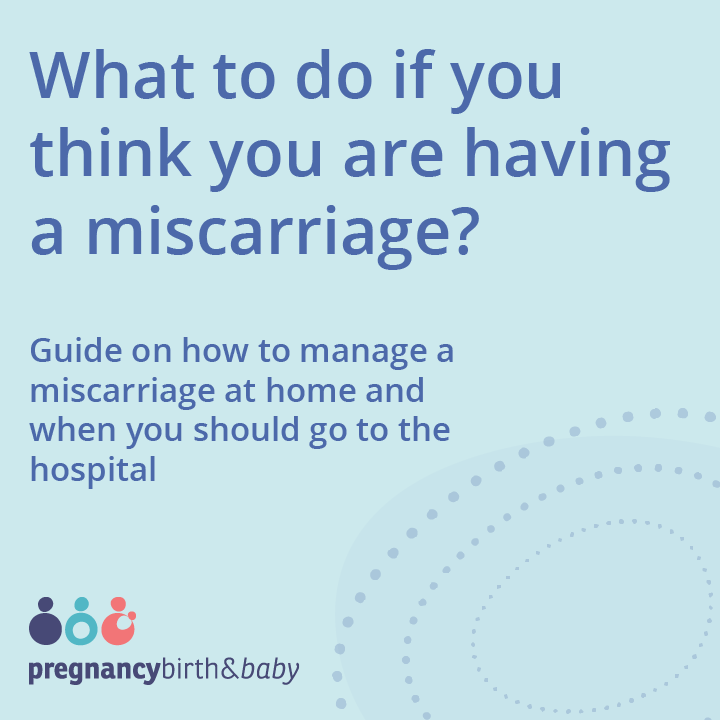What should I do if I think I'm having a miscarriage?
11-minute read
If you are pregnant and have very heavy bleeding or strong abdominal pain, go to your nearest hospital emergency department immediately. If you feel dizzy or faint or have trouble breathing, call triple zero (000) and ask for an ambulance.
Key facts
- If you are pregnant and having vaginal bleeding, you may be having a miscarriage.
- If your bleeding is heavy, or you have strong abdominal pain or dizziness, go immediately to a hospital emergency department.
- If your bleeding is not heavy and you feel well, contact your doctor or midwife straight away to find out what to do.
- A blood test and an ultrasound can diagnose a miscarriage.
- Pain and bleeding are common in early pregnancy and do not always mean you are having a miscarriage.
What is a miscarriage?
ºÚÁÏ³Ô¹Ï loss is when a pregnancy ends naturally before the baby can survive outside the uterus. When it happens before 20 weeks of pregnancy, it is called a miscarriage.
Early miscarriage happens in the first trimester of pregnancy, up to 14 weeks. It is the most common type.
Late miscarriage happens in the second trimester, up to 20 weeks.
ºÚÁÏ³Ô¹Ï loss is common. Some people may experience more than one loss.
Why do miscarriages happen?
Most miscarriages aren’t caused by anything you did or didn’t do. They usually happen because the baby doesn’t develop properly, often due to a genetic issue.
Sometimes a miscarriage may happen if you have:
- a health condition
- a different uterus shape
- an infection
What might a miscarriage feel or look like?
If you are having a miscarriage, you will probably have vaginal bleeding. This could range from light spotting to heavy bleeding with blood clots. You may also have cramping or lower abdominal pain.
Some people don’t have any symptoms and find out that they’ve had a miscarriage at a routine pregnancy check-up.
Pain and bleeding are common in early pregnancy and do not always mean you are having a miscarriage.
What really happens during a miscarriage?
WARNING — This article contains some graphic descriptions of what you might see during a miscarriage.
What should I do if I think Iʼm having a miscarriage?
If you are pregnant and have bleeding from your vagina, you may be having a miscarriage.
If your bleeding is not heavy and you generally feel well, contact your doctor or midwife. They can tell you what to do next. They might refer you to hospital or to an early pregnancy assessment service, or arrange tests to find out more.
When should I go to the nearest emergency department or call 000?
If you are feeling unwell, dizzy or faint, or if you are having trouble breathing, call triple zero (000) and ask for an ambulance.
If you are pregnant and bleeding from your vagina, go immediately to your nearest hospital emergency department if you have:
- heavy bleeding or passing large clots
- strong abdominal pain
- pain in your shoulder tip
- a fever or chills
- dizziness or feel faint
- vaginal discharge with an unpleasant smell
- shortness of breath or a fast heartbeat
- concerns about your health
Who should I contact for medical advice or care?
If you have begun pregnancy care, contact your doctor, obstetrician or midwife. If it is very early in your pregnancy and you have not yet begun pregnancy care, you can contact your family doctor (GP).
In major cities you may be referred to an early pregnancy assessment service (EPAS). This is a specialised clinic where people with non-urgent bleeding or pain in early pregnancy can be assessed and treated. If you live in a rural or regional area, an EPAS may not be accessible — ask your doctor or midwife where to get care.
How is a miscarriage diagnosed?
Your doctor or hospital team will arrange a blood test and an ultrasound to check what is going on:
- If there are signs that the pregnancy has stopped growing, they will diagnose a miscarriage.
- If the pregnancy is too early to know what is going on, your doctor will arrange for you to have another blood test and ultrasound in a few days.
- If the pregnancy is growing outside your uterus, they will diagnose an ectopic pregnancy.
How is a miscarriage treated?
Sadly, nothing can be done to prevent or stop miscarriage from happening if a pregnancy is developing abnormally.
Options to manage a miscarriage include:
- expectant management — waiting for the pregnancy tissue to pass by itself
- medical management — taking medicines to help your body pass the pregnancy tissue
- surgical management — a surgical procedure to empty your uterus
What happens if I miscarry at home?
If you have miscarried at home, see your doctor or EPAS clinic to check that all the pregnancy tissue has passed.
If you have a negative blood type, check with your doctor whether you need a dose of anti-D after your miscarriage. Read more on blood types in pregnancy.
Go to your nearest emergency department if:
- your bleeding is heavy
- you have pain in your shoulder tip
- your bleeding had become lighter but is now getting heavier again
- your bleeding continues for longer than 2 weeks
- you have severe pain that doesn’t get better with
- you feel faint or dizzy
- you have a or chills
- you have vaginal discharge with an unpleasant smell
How can I care for myself at home?
Get plenty of rest in the comfort of your home.
You can take paracetamol for pain and use a heat pack on your tummy.
It’s best to use sanitary pads rather than tampons to avoid infection.
If you are alone, consider calling your partner or a friend to be with you for support.
Consider contacting one of the support services listed below.
What to expect if I go to hospital?
You might prefer to have a planned surgical procedure in hospital, rather than wait at home and possibly need emergency surgery later. If you go to hospital, the treating team will arrange tests and give you anti-D if you need it.
Be sure to tell your treating team if you have cultural beliefs or preferences about what you’d prefer to do with the pregnancy tissue.
What happens next?
After a miscarriage, your bleeding will get lighter over time and will usually stop within 2 weeks. ºÚÁÏ³Ô¹Ï symptoms, such as nausea and tender breasts, will go away. If you had a miscarriage close to 20 weeks of pregnancy, your breasts might produce some milk.
See your doctor within 6 weeks. They may ask you to do another pregnancy test to confirm that all the pregnancy tissue has passed.
If you feel ready, it’s safe to get pregnant right after a miscarriage. If you don’t feel ready, talk to your doctor about contraception.
If you have had 2 or more miscarriages, your doctor may suggest seeing a fertility specialist.
Looking after your emotional wellbeing
Miscarriage can lead to many different emotions, such as sadness, grief, guilt, numbness or anger. Some people may develop depression or anxiety.
You and your partner, if you have one, may react in different ways. This can sometimes affect your relationship.
Read more on experiencing a pregnancy loss.
Who can I talk to for support?
It may help to talk to loved ones or others who have experienced pregnancy loss. You can also talk to your doctor or midwife.
If you have cultural or spiritual beliefs about pregnancy loss that affect how you feel, you may want to talk to an elder or religious leader.
If your strong feelings last for a long time or you think you might have , reach out to a counsellor or mental health professional. For advice and to get connected to local mental health services, call on 1800 595 212. Check the operating times.
There are many that provide online and telephone support services and are accessible throughout Australia, including in rural and remote areas.
If you need to talk to someone about your mental health, call Beyond Blue on 1300 22 4636.
FIND A HEALTH SERVICE — The Service Finder can help you find doctors, pharmacies, hospitals and other health services.
Resources and support
If you are looking for information, these factsheets are available:
- provides more information about miscarriage.
- (COPE) offers information on coping after miscarriage.
- provides information about the physical and emotional effects of miscarriage.
If you are looking for support, contact one of these groups:
- provides support for people affected by pregnancy loss. You can call them on 1300 308 307.
- The offers information and support for people who have experienced a miscarriage.
- provides counselling and support for people grieving any type of loss.
Find more information and support for:
- partners
You can also call ºÚÁϳԹÏ, Birth and Baby to speak to a maternal child health nurse on 1800 882 436 or video call. Available from 7 am to midnight (AET), 7 days a week (including public holidays).
Looking for information for Aboriginal and/or Torres Strait Islander people?
This booklet helps .
Find an (ACCHO) near you.
Do you prefer to read in languages other than English?
Find information in many community languages about:
- , types of miscarriage and support services
- information for

Speak to a maternal child health nurse
Call ºÚÁϳԹÏ, Birth and Baby to speak to a maternal child health nurse on 1800 882 436 or video call. Available 7am to midnight (AET), 7 days a week.
Learn more here about the development and quality assurance of healthdirect content.
Last reviewed: June 2025



